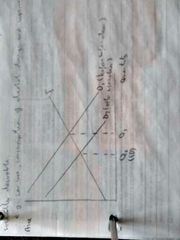![]()
![]()
![]()
Use LEFT and RIGHT arrow keys to navigate between flashcards;
Use UP and DOWN arrow keys to flip the card;
H to show hint;
A reads text to speech;
23 Cards in this Set
- Front
- Back
|
What is a demerit good? |
A good that is over-consumed and overproduced in the market economy. The price mechanism allocated more resources to their production than is socially desirable. |
|
|
Give and example of a demerit good. |
Alcohol, cigarettes, car use. |
|
|
Draw a diagram showing a demerit good |

|
|
|
What is a merit good? |
A good that is under consumed and underproduced in a market economy. The price mechanism allocated fewer resources to their production than is thought socially desirable. |
|
|
What are the characteristics of a private good? |
Private foods are rivalrous - consumption by one person leads to less of the good being available for others to consume. Private goods are excludable - once provided, it is possible to prevent others from consuming the good. |
|
|
What are the characteristics of a public good? |
Non-rivalrous - consumption of the good by one person dies not reduce the amount available for others to consume. Non-excludable - once provided, no person can be prevented from consuming them. Non-rejectable - once provided, it is impossible to reject consumption of the good. |
|
|
What is the marginal cost of providing an extra unit of a public good? |
Zero |
|
|
Are most goods private or public goods? |
Most goods are private goods. Very few goods are pure public goods. |
|
|
Give some examples of pure public goods. |
Police, defence, street lighting, air. |
|
|
What is the free rider problem? |
It is impossible to prevent people recieving the benefits of a public good once it has been provided. This men's that there is little incentive to pay for consumption of the good. A free rider is someone who receives the benefit from consuming a good or service but let's others pay for it. Individuals can increase their welfare by not paying for public goods. The presence of free riders in a market causes market failure, and public goods to be under-provided by the market. |
|
|
Give an example of the free ride problem. |
In a free market economy, national defence would not be provided. The firm providing defence cannot charge for the product as it does not benefit individual citizens. No-one would Aly fir defence so the market would not provide it. |
|
|
How is the free rider problem resolved? |
The state provides man public goods and covers it's costs through taxation. |
|
|
What is a quasi-public good? |
A good which shares some characteristics with public goods, but which firms can generally exclude consumers who haven't paid from consuming. |
|
|
Give an example of a quasi-public good. |
Toll roads, TV subscriptions. |
|
|
Why must government still provide some quasi-public goods? |
Some goods which are non-rival (such as country roads) will not be profitable to provide for firms and so will be under-provided in the free market. |
|
|
For markets to be competitive, what do all producers and consumers need? |
For markets to be fully competitive, all consumers and producers need to enjoy perfect (complete and costless) information. |
|
|
Will rational economic decisions made with perfect information always lead to market delivering productively and alocatively efficient outcomes? |
Yes. |
|
|
What are the 5 types of information failure? |
Inacurate or incomplete information (e.g. advertising). Uncertainty of information (e.g. about future benefits of pensions). Misunderstanding (e.g. scientific research). Complex information (e.g. buying a phone contract). Asymetric information (e.g. Akerlof's lemons). |
|
|
What is asmetric information? |
When one agent in an economic transaction has more information about a good o service than another and uses this to their advantage. |
|
|
What is adverse selection? |
When an economic agent who has superior knowledge leaves the market altogether. This can lead to markets ceasing to exist altogether. E.g. highly productive workers, low risk insurees, people who own above average quality second hand cars). |
|
|
What is moral hazard? |
When one person takes more risks because someone LSE has agreed to bear the burden of those risks. E.g. health insurance, central banks 'rescue packages'. |
|
|
What two or Ken's are encountered v firms trying to set prices (insurance premiums) in the market for health insurance? |
Adverse selection - this occurs when only those at greatest risk take out insurance. Those who are most likely to fall ill, or who have been ill previously, are most likely to take out health insurance. Insurers may not have full information to correctly set premiums. Moral hazard - occurs when those who take out insurance change their behaviour once they are insured. There is a temptation to take more risks when the risk is borne by a 3rd party (e.g. an insurance company). As a result, insured people become less concerned with protecting their health. |
|
|
Give some examples of ways to tackle information failure. |
Trial periods/warranties and guarantees/independent checking Advertising standards Provision of information/education Tax incentives and subsidies |

